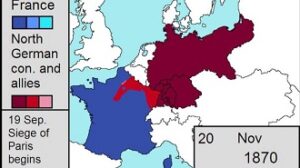
The causes of peace
This is the subtitle of chapter 7 “Why are we like this (2)?” of Theodore Dalrymple’s book that we analyzed this week, topic 1 which deals in particular with transcendence, we left it for the last analysis, although the book does not end there, although this title goes to “Why are we like this (7)?” and then talks consequences, but I think we should first think about why we think that way and where did our culture go, which is the author’s essential purpose expressed in other books of his authorship.
Dalrymple’s book that we analyzed this week, topic 1 which deals in particular with transcendence, we left it for the last analysis, although the book does not end there, although this title goes to “Why are we like this (7)?” and then talks consequences, but I think we should first think about why we think that way and where did our culture go, which is the author’s essential purpose expressed in other books of his authorship.
The aspect of the causes of contemporary relativism was already discussed in the previous topic: empirical and abstract, but without overcoming in depth the dichotomy about logical (abstract) truth and scientific empiricism (valid in laboratories for specific cases) which also already has its questions both in philosophy and in science itself, see the anachronistic case of the virus, it cannot be prevented because mutations cannot be controlled and nature also reveals its strength in negative aspects, we hope that the positive thing is to rebalance the disastrous human action.
The author’s approach is interesting, but it is restricted to the European sphere, there is no analysis neither in this author nor in other Europeans there is no analysis of the colonial dispute, also in the leftmost analysis of Slavoj Žižek (I will write without the accents in the Z because for non-Slavs this is too extravagant), because in my view they all focus on state power and its palliative solutions. The peace analysis starts from the idea that the last two wars were basically caused by the conflict between Germany and France (there was the previous Franco-Prussian war, see the map), and the European Union could be a “cause of peace” since a greater harmony in Europe could destroy the reasons for the first two wars. big conflicts.
It was thought then that no one believes that “France would attack Germany, not the other way around. The resulting conclusion would be the following: without this vast European apparatus of containment, the Hun [name given to Germans during the wars] would revert to its old form” (Dalrymple, p. 111). The scenario at the time of the book seemed stable, and although it is plausible to think that greater “unity” between nations means less war, there was no thought of the possibility of England leaving the Union (Brexit, started in a plebiscite in 2017 and finalized in 2020), nor a more recent Soviet turnaround from Russia.
So the causes of peace, as we have already defended this thesis in other posts, almost always result from bad peace agreements, not just truces, but what promises a stable future, because that was how the bad agreement between Germany and France after the first World War, resulted in the Second, although the trigger was the assassination of Archduke Francis Ferdinand, heir to the already fragile Austro-Hungarian Empire and see that this region can be a trigger again once Bosnia and Serbia wave to the Russian government, and the second war ends with bad deals between NATO and the soviet empire.
The entry of countries from the east to the European Union should be distinct from joining NATO’s military force, this for example is the case with Turkey, although the threat of leaving the community remains.
However, the author points out the Achilles heel of the European Union, a “pension fund” for tired politicians who want to maintain their clientelism: “after having been defeated or losing the willingness to go through the rigors of the electoral process” (p 117).
In comparison with the Soviet state, the author says that it is possible to identify the subject fed by the EU from a kilometer and a half away: “it is a type of subject that has developed that typical countenance of the former members of the Soviet Politburo”, a tendency of the current states the left or the right, within a reasonable proposal that is a greater union between nations, which should differ from states where the appetites of its members are satisfied by those who best know how to manage their appetites, and this does not lead to a true new co-governance and true management of the public good.
So the cause of peace that would apparently come (in 2010) from a greater integration of countries, nations continue in their cultural differences, unfortunately it did not come true, the model of Pax Eterna is bankrupt.
Dalrymple, Theodore (2016). A nova síndrome de Vicky: porque os intelectuais europeus se rendem ao barbarismo. Transl. Maurício G. Righi. Brazil, São Paulo: É realizações, original english 2010.









